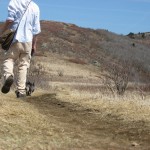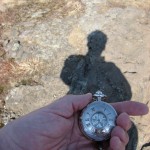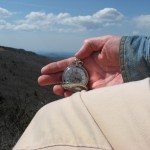Last week, I sat in on a lecture on Ancient Philosophy at the University of North Carolina at Asheville. It was really enjoyable to see how well Brian Hook did the lecture, and also reassuring that there didn’t seem to be anything I was missing. When he was discussing Aristotle’s virtues, my mind began to wander, and I began to wonder what the virtues of our age are, or rather, what they should be. What habits of character do we need to cultivate?
For the Ancient Philosopher Aristotle, living a good life, living “well-souled” (eudaimonia) or happily, was a matter of cultivating virtues, or character traits that lead to living well. He describes these virtues as a proper balance between two extremes. This is sometimes discribed as the Via Media or middle path. For example, Courage is a prominent Greek virtue—as Alexander the Great’s tutor, Aristotle was in tune with the Homeric warrior culture that underpinned their culture. For Aristotle, Courage is not an ideal like it would be for Plato, a perfection to be aimed at, but instead it was a balance between Cowardice on the one side, and Fool-heartiness on the other. A man shouldn’t run from every confrontation, but on the other hand, he shouldn’t run towards every confrontation, either. A person shouldn’t allow pleasure to rule them, but he or she shouldn’t be numb, either; a virtuous person should be temperate. Of course, part of the problem teaching Aristotle is that the English words—temperate, magnanimous, etc.—we use for virtues are outdated and almost as alien to our ears as the Greek would be.
For example, Courage is a prominent Greek virtue—as Alexander the Great’s tutor, Aristotle was in tune with the Homeric warrior culture that underpinned their culture. For Aristotle, Courage is not an ideal like it would be for Plato, a perfection to be aimed at, but instead it was a balance between Cowardice on the one side, and Fool-heartiness on the other. A man shouldn’t run from every confrontation, but on the other hand, he shouldn’t run towards every confrontation, either. A person shouldn’t allow pleasure to rule them, but he or she shouldn’t be numb, either; a virtuous person should be temperate. Of course, part of the problem teaching Aristotle is that the English words—temperate, magnanimous, etc.—we use for virtues are outdated and almost as alien to our ears as the Greek would be.
We live in an age of speed. I can have books at my doorstep within days or on my device with in seconds. I can communicate instantly with friends in Germany (if they are still up) or friends in on the Pacific Coast (if they are up yet). The town I live in and the town I work in used to be half a day apart, then were an hour apart, then were 45 minutes apart, when I moved here 30 years ago were 30 minutes apart, and now are 15 minutes apart.
in seconds. I can communicate instantly with friends in Germany (if they are still up) or friends in on the Pacific Coast (if they are up yet). The town I live in and the town I work in used to be half a day apart, then were an hour apart, then were 45 minutes apart, when I moved here 30 years ago were 30 minutes apart, and now are 15 minutes apart.
Much of this is good: it is nice to be able to keep in touch with Lois or Daniel or Karyn & Rich or Katy or Brandon. I enjoy the fact that I am able to walk the Appalachian Trail outside of Hampton Tennessee in the morning and work at the Johnson City Tennessee Barnes & Noble in the evening. But for many people, this very speed of life has changed how we live. In order to keep up with all the places we have to be,  we spend more time in our cars. Because we can do soccer and zumba and school and work, most families do all these things. And other things become fast as well. As our employers continue to have to cut costs, and we have to do more and more with less and less, even professions which used to be leisurely, like medicine and teaching and selling books, are feeling more and more like conveyer belts. Fast food—either the drive-through joints or food that relies more and more upon processed food—becomes a bigger and bigger part of how we eat. Fast communication—not just texting and Facebooking, but even the quickness of passing conversations—become the norm. We are speed-dating our own lives.
we spend more time in our cars. Because we can do soccer and zumba and school and work, most families do all these things. And other things become fast as well. As our employers continue to have to cut costs, and we have to do more and more with less and less, even professions which used to be leisurely, like medicine and teaching and selling books, are feeling more and more like conveyer belts. Fast food—either the drive-through joints or food that relies more and more upon processed food—becomes a bigger and bigger part of how we eat. Fast communication—not just texting and Facebooking, but even the quickness of passing conversations—become the norm. We are speed-dating our own lives.
Let me suggest that a virtue we need to cultivate to live well in this time is something between the speed at which life seems to be forcing us to run and an inertia of resignation, passivity and entertainment which seems to be the other alternative.  Now, anybody who knows me will be amused that I would be the spokesperson for slowness—it does seem so natural. However, there is something to be said for taking a cue from the various slow movements that have started in the last decade. I have already written about the importance of slow mail. I have friends who are involved with parts of the slow food movement. In particular, many of my friends have taken to preparing food from the ground up. The answer to fast food thrown from a drive-through window is planting (or raising) your meals, cultivating them, and then cooking them yourself. But there are other areas in which we can slow down. We can try to walk or bike instead of driving. Read instead of watching. Knit or sew.
Now, anybody who knows me will be amused that I would be the spokesperson for slowness—it does seem so natural. However, there is something to be said for taking a cue from the various slow movements that have started in the last decade. I have already written about the importance of slow mail. I have friends who are involved with parts of the slow food movement. In particular, many of my friends have taken to preparing food from the ground up. The answer to fast food thrown from a drive-through window is planting (or raising) your meals, cultivating them, and then cooking them yourself. But there are other areas in which we can slow down. We can try to walk or bike instead of driving. Read instead of watching. Knit or sew.
Slowness seems negative, though, so let me suggest another term. In regard to the speed of life, the mean between the extremes of speed and inertia is moving—and living—deliberately. We can cook and eat at a deliberate pace at which we can be aware of the food and cook it well, and enjoy it. We can communicate at a deliberate pace at which we can be aware of the unspoken cues of our partners, children, friends, coworkers, and clients, and take the time to follow up on questions, and—most of all—to connect. We can move through the world in such a way that we are aware of our surroundings, deliberately, so that we are also aware of ourselves.
is moving—and living—deliberately. We can cook and eat at a deliberate pace at which we can be aware of the food and cook it well, and enjoy it. We can communicate at a deliberate pace at which we can be aware of the unspoken cues of our partners, children, friends, coworkers, and clients, and take the time to follow up on questions, and—most of all—to connect. We can move through the world in such a way that we are aware of our surroundings, deliberately, so that we are also aware of ourselves.
In the words of the original hipster and inventor of the No.2 pencil (whose name, appropriately enough, is pronounced like “thorough”):
I went to the woods because I wished to live deliberately, to front only the essential facts of life, and see if I could not learn what it had to teach, and not, when I came to die, discover that I had not lived. I did not wish to live what was not life, living is so dear; nor did I wish to practise resignation, unless it was quite necessary. I wanted to live deep and suck out all the marrow of life, to live so sturdily and Spartan-like as to put to rout all that was not life, to cut a broad swath and shave close, to drive life into a corner, and reduce it to its lowest terms.
In an age where the only two options seem to be to join the frenentic rush or to resign ourselves and drop by the wayside, we must learn to choose our own way, and our own pace. What we choose to do, we can do with care, and do deliberately.

“We are speed-dating our own lives.” Perfect way to say it. I think most of us are hitting middle age and going through our own stressful times. Watching as time is going by us, passing us up faster and faster. Most of us realize we are getting old really fast. We just can’t work in a hay field all day, hoe acres of garden, or even hold a wrench to tighten a pipe, or open a Dr. Enuf bottle. I’m always thinking, I’m old and getting older and haven’t done anything with my life. Then I realize I don’t really want to go anywhere since I get homesick. I dont really want to do anything big with my life since I’m perfectly happy to stay home with my animal babies and husband. I just want some peace and calm and no worries, then I realize how that sounds an awful lot like death.
At the risk of engaging in nostalgia (to which I try to remain generally adverse, and which I think is deeply inappropriate for anyone who grew up, as I did, in the 1970s and 80s), your post reminded me of this Breakfast Club joke, Robert:
http://mashable.com/2013/04/03/breakfast-club-today/